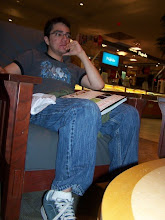
"Music and silence – how I detest them both! How thankful we should be that ever since our Father entered Hell – though longer ago than humans, reckoning in light years, could express – no square inch of internal space and no moment of infernal time has been surrendered to either of those abominable forces, but all has been occupied by Noise – Noise, the grand dynamism, the audible expression of all that is exultant, ruthless, and virile – Noise which alone defends us from silly qualms, despairing scruples, and impossible desires. We will make the whole universe a noise in the end...The melodies and silences of Heaven will be shouted down in the end...
"In the heat of composition I find that I have inadvertently allowed myself to assume the form of a large centipede. I am accordingly dictating the rest to my secretary."
What makes C.S. Lewis' The Screwtape Letters relevant, despite its World War II background, is that it addresses temptations that are still very present in our society. Told in a series of letters from a senior demon named Screwtape to his nephew Wormwood, Lewis depicts humanity's faults, and conversely, humanity's best qualities. In each letter, Screwtape points out our weaknesses, and elaborates how Wormwood can exploit those weaknesses to capture our souls.
What is timeless about this piece is that these same weaknesses exist in us today. Lewis comments in the forward that he simply looked at his own temptations and shortfalls for inspiration.
What prevents this book from being preachy is that it criticizes all poor human behavior, especially those of overly pious Christians. Included in my book was "Screwtape Proposes a Toast," a speech given to a graduating class of demons that concludes with Screwtape raising a glass of Pharisee. This wine is composed of self-righteous humans who practiced a religion of hate rather than what Christ really taught.
What really makes this book stand out is Lewis' perspective on demons. Rather than black batlike creatures, they are like businessmen sitting in bureaucratic offices, calmly and coldly coming up with ways to capture us. They aren't part of some diabolical pursuit of evil like a cartoon villain, but they want our souls as a sort of food. Their demon bodies are constantly hungry, greedy for more to devour. And while there is a lot of humor in this book, it's a dark sort of humor. After you laugh, you pause to think about the truth of what Lewis has written, and shudder a little.
But it is important to laugh. Nothing loses power faster than after it has become a joke. Two quotes Lewis provides at the beginning sum this up better than I ever could. The first is from Luther: "The best way to drive out the devil, if he will not yield to text of Scripture, is to jeer and flout him, for he cannot bear scorn." The second, from Thomas More, is slightly more succinct: "The devil...that prowde spirite…cannot endure to be mocked."
A closing note: Walden Media is supposedly adapting the book for the screen. I'm not sure how this would work without adding a whole other storyline around the human Wormwood is tempting, but it could be interesting to see.










